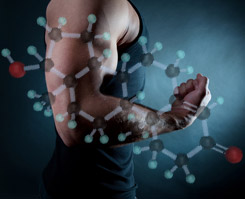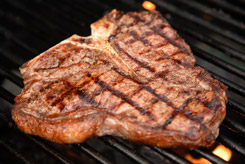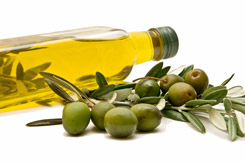Q&A with Mike Furci
05/27/2010
Furci Home / Fitness Channel / Bullz-Eye Home

 Hey Mike,
Hey Mike,
I just read your article “More Muscle & More Sex” (parts 1 and 2), and I have been thinking about getting a testosterone booster for a little bit now. I’m 23 years old, just recently started working out again seriously, and am a hard gainer. I’m weighing in at around 190 pounds right now, and my goal is to cut down and have a lot of lean muscle and be cut. I was wondering if a testosterone booster like Tribex or Hardcore ZMA would be good for me, or, is it too early of an age for me to take these?
Also, I was wondering if I were to take these, would my body naturally stop producing testosterone or decrease in productivity?
Thanks,
Brad
 Brad,
Brad,
These products would be fine for you to take. These products will not raise your testosterone to super-physiologic levels, so your body will not lower your endogenous testosterone in an effort to keep homeostasis. Our bodies prefer to be in “balance,” and hormone levels are no exception. Take into consideration some people do not respond well to Tribex, or any other testosterone booster for that matter. Just like drugs, supplements will have varying effects on different people.
Take all supplements with some skepticism; this will help to ensure your gains are not a placebo effect. There is no magic in taking any supplement, and they sure as hell don’t give drug-like effects like some ads claim. Don’t expect to gain five to 10 pounds of muscle in five weeks from any supplement. And most importantly, nothing will work well without a good diet that includes quality protein and whole natural foods, combined with a strong training program.
 Mike,
Mike,
Your article, “Get Shredded,” was excellent. Thank you very much for writing it. One quick question:
You recommend avoiding any processed foods but then recommend whey protein supplements, which I assume are processed foods. If you should not eat any processed food or supplement, what food would you eat to get the best protein?
Thanks again for the great article,
Michael

 Michael,
Michael,
Yes it is true -- protein powders are considered a processed food. In fact, a cooked steak is technically a processed food. Unless it’s raw and 100 percent organic, it’s processed. The difference between high quality protein powders like micellar casein or bovine serum concentrate, and processed/convenience foods, is the end result.
Processed/convenience foods are far from their natural state. They may resemble familiar foods, but they are anything but. Just look at a half gallon of milk, one of the least processed foods the average American consumes. It’s homogenized and pasteurized for our convenience, not for our health.
Homogenization is the process of forcing whole milk through small orifices under very high pressure. This breaks the fat globules into much smaller particles and prevents the cream from rising to the top. Homogenization destroys the fat so we don’t have to shake it up every time we drink it.
Pasteurization is a heating process designed to destroy all bacteria and enzyme activity. Along with sterility, the pasteurized product then has a much longer shelf life. UHT pasteurized milk can last for months without refrigeration. Convenient, yes. Healthy, no. Raw milk, which is unprocessed, is miles apart from the milk you buy in the grocery store, and much more healthy.
A high quality protein powder, which by definition is processed, is made from some of the best parts of milk. The extracted proteins, which have several health benefits including improved immune function, are not denatured in a high quality product. The worst part of a protein powder, in regards to processing, is the flavoring and the sweetener. Fortunately, for those of you who desire the most natural product available, you can purchase powders that have no extra ingredients.
So, to answer your question, what foods would I eat to get the best protein without processed foods or protein powders? I would eat a diet consisting of animals that were wild, true free-range, or properly grass fed. I would also eat and drink raw dairy products. There are no better sources of nutrients than animal products.
 Hi Mike,
Hi Mike,
I recently read your article and became quite interesting about changing my lifestyle, so I am gathering lots of info concerning which oils are beneficial, and which aren’t.
All my life I have heard that coconut oil was unhealthy. Of course, this can change, since research is being done, but still:
Why promote coconut oil, if it’s saturated? It may be better just for cooking, I guess.
You say: “Don't consume any product that contains ‘vegetable oil,’ ‘hydrogenated vegetable oil,’ ‘partially hydrogenated vegetable oil or ‘shortening’ listed as one of the ingredients." But coconut oil and olive oil are the earliest recorded sources of vegetable oil! That's why I find some of your article contradictory. Maybe you can help me out!
Plus I found this article.
Thanks in advance
Gahariet

 Gahariet,
Gahariet,
Olives are a fruit grown on trees, which makes olive oil technically fruit oil, not vegetable oil. However, olive oil is considered the best vegetable monosaturated fat to use in cooking because of its high oxidation threshold. However, it is not recommended for repeated use or deep-frying. Purchasing extra virgin olive oil ensures that it has not been extracted with heat or detergents. Olive oil that is not labeled “Extra Virgin” comes to stores already denatured, and containing high amounts of free radicals from the extraction process.
Taken from the fruit portion of the seed of the coconut palm tree, coconut oil is also technically a fruit oil, one the most beneficial foods you can consume. In tropical regions where coconut oil, or fat, is a large portion of the caloric intake, people are much healthier and experience a much lower incidence of the modern diseases than we do in the U.S. I urge you to read one of the most ground-breaking books on nutrition and its effects on health, “Nutrition and Physical Degeneration,” by Weston A. Price.
I checked out the link you provided and am not surprised saturated fats are portrayed as a villain, as proponents of the lipid hypothesis have done for decades. The lipid hypothesis is archaic, untenable, and is the single biggest contributor to ill health in the U.S. Check this out: Butter is Better
FYI: Fats, Cholesterol and the Lipid Hypothesis and westonaprice.org
Hope this helps.
 Mr. Furci,
Mr. Furci,
I recently read some of your articles and you recommend not spending more than 45 to 60 minutes in the gym. I am training intensively sometimes up to three hours a day between weight lifting, running, stretching, and doing reps of pushups, sit-ups and pull-ups. If I break this up into two or three workouts in a day, will I be able to get the desired benefit these workouts?
Thanks,
Kevin
Montreal
 Kevin,
Kevin,
What is your goal (or goals)? If building muscle is your main goal, cardio and excessive reps repeated several times per week are going to have to come to a halt. If you’re just interested in being active and don’t really have any goals, then by all means continue what you’re doing. But, if your goal is to get a little muscle and to be lean, your workouts are going to have to change drastically.

OK, let’s be honest about cardio’s benefit-to-work ratio. For traditional cardio you see all over North America, I give it an F. In other words, for the amount of work that’s put into it, it doesn't yield a lot of results. Look at all the people who do cardio religiously without losing much weight, if any at all. I see them in the gym every day. Women are especially hooked on the cardio myth. I see so many people doing hour after hour of cardio without making much progress after months (and sometimes years). Adding muscle through resistance training and modifying your diet are the best ways in which to attain a lean, healthy body.
With my clients, if they insist on doing cardio, I recommend doing two days of interval training no longer than 20 minutes, and one day of medium intense cardio. For the intervals I recommend doing them on a stair climber and/or an elliptical machine with a 1-to-1 work-to-rest ratio. That means that after a 5-minute warm-up, you bust your ass for one minute, then reduce the intensity to almost a stop and perform a 1-minute rest interval. You’ll repeat this 5 to 7 times. Interval training is the best way to not only burn the most amount of calories in the least amount of time, but it will get your fitness level higher and quicker than any other type of cardio.
Three hours of training per day is completely out of line. Split your routine up into three or four days per week, not two or three times per day! Corisol, which is an anticatabolic hormone, remains elevated for up to 48 hours after an intense workout. Days off are essential. Use an easy 3-day split like this: chest, shoulders, triceps on day one; back and biceps on day two; and legs on day three. You can also do a 4-day split like this; chest and shoulders on day 1; back and calves on day 2; arms on day ; and legs on day 4. Perform your push-ups at the end of your chest routine and pull-ups during your back routine. Do not do push-ups or pull-ups on your off days. Hit your abs like everything else -- once per week. For more info, see my three-part series, A No-Nonsense Guide to Design Your Workouts.
Good luck.
You can follow us on Twitter and Facebook for content updates. Also, sign up for our email list for weekly updates and check us out on Google+ as well.













